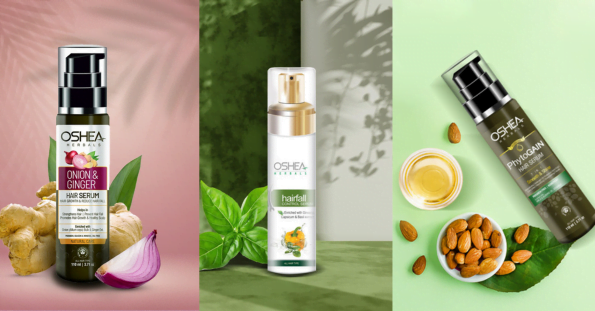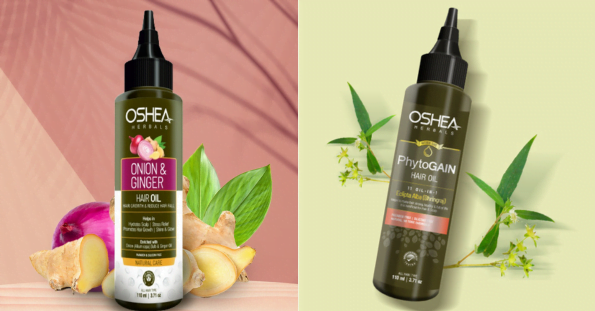Hair Serum vs. Hair Oil: Which is Better?
We all want smooth & shiny hair that looks fabulous and flows so perfectly in the air. But how do we get it? There are so many products in the market which brings all the more confusion to the mind. The two most common products that help us achieve healthy hair which looks absolutely gorgeous are hair oil and hair serum. If these two products in the market puzzle you, this article is for you!
Regular usage of these two will certainly make your hair silky, bouncy & beautiful. Here is how hair oil and hair serums differ in usage, purpose & application to help you learn to apply them right and enjoy frizz-free hair.
What is a Hair Serum?

Hair serum is a product that caters to hair concerns and provides several benefits. It is typically a formula containing oils, which is applied to damp or dry hair with a focus on the lengths and ends.
Here are seven advantages of incorporating a hair serum into your routine:
1. Frizz Control
Hair serums are formulated with ingredients that help smooth the layer of your strands reducing frizz and flyaways. This results in manageable-looking hair.
2. Shine Enhancement
Serums contribute to enhancing the shine and glossiness of your locks giving them a more vibrant appearance. They can work wonders on dry-looking tresses.
Also Read: 5 Reasons Why You Should Oil Your Hair
3. Heat Protection
Numerous hair serums incorporate protectants that shield your hair from the consequences of using heat-styling tools like blow dryers, flat irons, and curling irons.
4. Hydration
Hair serums often include components that aid, in hydrating and nourishing dry and damaged hair resulting in a smoother feel.
5. Split End Prevention
By sealing the hair cuticle serums can temporarily repair split ends giving your hair an appearance while preventing damage.
6. UV Protection
Certain hair serums provide defense against UV rays, which can assist in preserving your hair color and shielding it from harm.
7. Tangle Reduction
The application of a natural hair serum or a good quality serum can enhance manageability by minimizing tangles and knots making it easier to comb or brush through your hair.
Also Read: 5 Reasons Why You Should Choose A Hair Vitalizer
How to Apply Hair Serum?
- Start with clean, towel-dried hair: Once you’ve finished washing your hair gently pat it with a towel, until it’s damp but not sopping wet.
- Dispense a small amount: Depending on the length and thickness of your hair take a dollop or a few drops of hair serum and rub it between your palms.
- Spread evenly: Make sure to distribute the serum by running your hands through the lengths and ends of your hair. Avoid applying it to your scalp as this might leave your hair looking greasy.
- Comb or brush through: Use a toothed comb or brush to spread the serum throughout all of your strands. This ensures that every strand gets coated with the serum.
- Style as desired: You can choose to either let your hair air dry or use styling tools as you normally would. The serum will provide heat protection. Help your hairstyle hold better.
Who Should Apply Hair Serum?
People should apply hair serum if they have:
- Dry or Damaged Hair
- Frizzy Hair
- Colored or Treated Hair
- Fine Hair
- Heat Styling Enthusiasts
- Or Anyone Seeking a Polished Look
Also Read: Natural Ingredients For Hair
What is a Hair Oil?

Hair oil, whether derived from synthetic sources or natural sources, is an oil-based product that is utilized to nourish and maintain the health of both the hair and scalp. Its usage, as a beauty treatment spans across cultures, throughout history. The application of hair oil bestows a multitude of advantages on your hair and scalp. Let’s explore seven of these benefits below:
1. Deep Conditioning
Hair oil offers deep conditioning properties, which effectively moisturize and nourish the hair from root, to tip. This is especially advantageous for individuals with damaged hair.
2. Improved Scalp Health
Enhancing scalp health is another benefit of massaging hair oil into the scalp. This is the main difference between hair oil and hair serum. This technique helps stimulate circulation leading to better scalp health. Additionally, it can alleviate issues such as dandruff and dryness.
Also Read: 11 Benefits Of Amla Powder For Hair | DIY Amla Powder Hair Masks
3. Frizz Control
Controlling frizz becomes more manageable with the use of hair oil. By smoothing the hair cuticle it provides a sleeker appearance and improved manageability.
4. Split End Prevention
Regular application of hair oil can help prevent split ends by supplying moisture and sealing the cuticle reducing the occurrence of splits.
5. Strength and Elasticity
Hair oils that contain vitamins and nutrients contribute to strengthening the hair shaft resulting in reduced breakage and increased elasticity.
6. Shine Enhancement
In addition to its benefits using hair oil adds a shine and gloss to your locks making them appear healthier and more vibrant.
7. Protection from Environmental Damage
Furthermore by forming a barrier against pollutants and harmful UV rays hair oil safeguards your tresses, from potential damage caused by external factors.
Also Read: Top 3 Ayurvedic Herbs For Hair
How to Apply Hair Oil?
- Choose the Right Oil: Opt, for a hair oil that suits your hair type and concerns. There are options available including coconut oil, argan oil, jojoba oil, olive oil, and almond oil.
- Preparation: To ensure application slightly warm the chosen oil. You can achieve this by placing the container in a bowl of water or following the product instructions for microwaving. Make sure the temperature is comfortably warm but not hot.
- Section Your Hair: To make the application process easier divide your hair into sections.
- Apply to Scalp: Start, by massaging the warmed oil into your scalp using your fingertips. Apply it in motions to enhance blood circulation and ensure distribution.
- Apply to Hair: Once you’ve massaged your scalp proceed to apply the oil along the lengths and ends of your hair. Ensure that all strands are thoroughly coated with the oil.
- Comb Through: Use a toothed comb or brush to distribute and spread out the oil throughout your hair.
- Wrap and Wait: For conditioning purposes, you have the option of covering your hair with a shower cap or a warm towel. Leave it on for 30 minutes to a few hours for an effective treatment. Some individuals even prefer leaving it for a nourishing experience.
- Shampoo and Rinse: After completing the desired treatment duration proceed with shampooing your hair as usual in order to remove any remaining traces of oil.
Who should apply hair oil?
You should apply hair oil if you have:
- Dry or Damaged Hair
- Dandruff or Itchy Scalp
- Frizzy Hair
- Natural Hair
- Anyone Seeking Extra Shine
Also Read: 15 Homemade Chia Seeds Face Mask For Skin & Hair
Hair Serum vs. Hair Oil
There are numerous differences between hair serum and hair oil. Although you can include both of these in your hair care routine, the method to use them differs. Read the differences below and you’ll know how these two vary from each other.
1. Composition
- Hair Serum: Hair serums are usually made with a base of either water or silicone. They have a consistency. Commonly include ingredients such, as silicones, amino acids, and vitamins. Some serums may also provide protection against UV rays and heat damage.
- Hair Oil: Hair oils are primarily composed of natural oils. Popular hair oil options include coconut oil, argan oil, olive oil, and jojoba oil. These oils are rich, in fatty acids and essential nutrients that promote hair.
2. Purpose
- Hair Serum: Hair serums are mainly created to style your hair offering benefits such as frizz control, added shine, and protection from heat when using styling tools, like hair dryers or straighteners.
- Hair Oil: On the other hand, hair oils serve a variety of purposes that contribute to the well-being of your hair and scalp. They deeply nourish your hair while also promoting hair growth. This is a major difference between hair serum and hair oil.
3. Weight and Texture
- Hair Serum: Serums are lightweight and have a thinner, more liquid-like consistency. They are quickly absorbed by the hair and do not leave a greasy or heavy feeling.
- Hair Oil: Hair oils are thicker and more viscous due to their oil-based nature. They tend to leave a heavier feeling on the hair, which some people may find greasy if used excessively.
4. Application
- Hair Serum: Hair serum is typically applied to damp or dry hair and is mainly focused on the lengths and ends. It’s often used as a finishing touch in styling routines or as a heat protectant before using hot styling tools.
- Hair Oil: Hair oil can be applied to both the scalp and the lengths of the hair. It is often used as a pre-shampoo treatment for deep conditioning or massaged into the scalp to improve scalp health. Some people also use it as a leave-in conditioner on the lengths and ends.
Also Read: Top 5 Homemade Hair Masks To Prevent Hair Fall
5. Who Should Use Them
- Hair Serum: Hair serums are ideal for those looking to style their hair, control frizz, add shine, or protect their hair from heat damage during styling. They are suitable for a wide range of hair types.
- Hair Oil: Hair oils are beneficial for individuals with specific hair and scalp concerns, such as dryness, damage, dandruff, or those seeking deep conditioning. The choice of oil should align with the specific needs of the hair and scalp.
Conclusion
Choosing between hair serum and hair oil depends on your specific hair care needs and goals. Hair serum, for women mostly, is ideal for styling and protection, while hair oil offers deep conditioning and scalp health benefits. Consider your hair type and concerns when deciding which product to incorporate into your routine.
Frequently Asked Questions
1. Which is better: serum or oil for hair?
The choice between hair serum and hair oil depends on your specific needs. Hair serum is better for styling and protection, while hair oil offers deep conditioning and scalp health benefits.
2. Can I use hair serum every day?
Yes, you can use hair serum every day if needed. It’s lightweight and designed for daily use, especially for styling and managing frizz.
3. Is hair serum the same as hair oil?
No, hair serum and hair oil are different products. Hair serum is typically water or silicone-based and used for styling, while hair oil is oil-based and used for deep conditioning and scalp health.
Disclaimer: This article has been written after thorough research and is based on the resources available on the internet. It is still advisable to contact an expert before adapting to a new product.











Leave a comment
Please note, comments need to be approved before they are published.